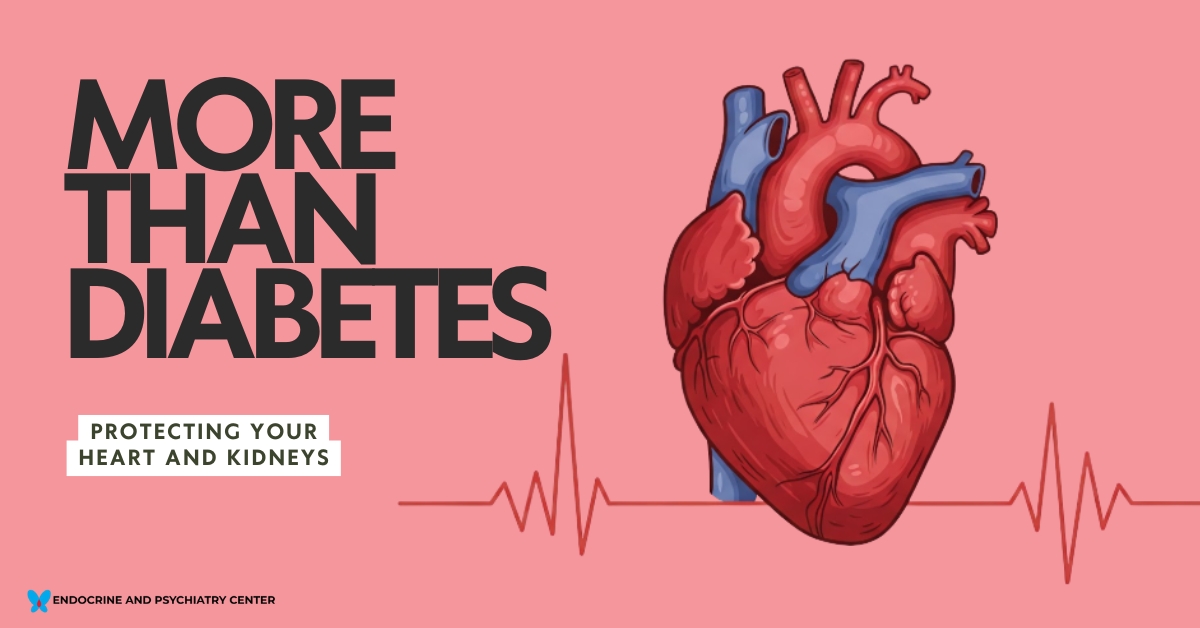- About Us
- Locations
- Meet the Team
-
Patient Resources
-
-
Patient Information
-
-
-
Services
-
-
All Services
-
Proudly Part of Privia Health

A Diabetes Drug That Helps the Heart? Yes – Even Without Diabetes!

What’s All the Buzz About Heart Failure and SGLT2 Inhibitors?
If you or someone you love has heart problems, you may have heard about a new kind of medicine making waves in the medical world. It’s called an SGLT2 inhibitor. That’s a long name, but don’t worry—we’ll break it down for you.
The exciting part? Doctors now recommend SGLT2 inhibitors even for people who don’t have diabetes. Yes, you read that right!
This blog will explain:
- What SGLT2 inhibitors are
- What heart failure is
- Why this diabetes drug can help the heart
- Who might benefit from this medicine
- What side effects to watch for
Let’s get started.
What Is Heart Failure?
Heart failure doesn’t mean your heart has stopped working. It means your heart isn’t pumping blood as well as it should.
Think of your heart like a pump. When it’s weak, your body doesn’t get enough blood, oxygen, or nutrients. That can make you tired, short of breath, or swollen in the legs and feet.
There Are Two Main Types of Heart Failure:
- Heart failure with reduced ejection fraction (HFrEF): Your heart muscle is weak and can’t pump enough blood.
- Heart failure with preserved ejection fraction (HFpEF): Your heart pumps normally but is too stiff to fill with enough blood.
Both types can make you feel sick, and both can be helped by new treatments—including SGLT2 inhibitors.
What Are SGLT2 Inhibitors?
SGLT2 stands for “sodium-glucose co-transporter 2.” That’s a fancy way of saying this medicine helps your body get rid of sugar in your pee. It was first used to help people with type 2 diabetes lower their blood sugar.
Examples of SGLT2 Inhibitors:
- Dapagliflozin (Farxiga)
- Empagliflozin (Jardiance)
- Canagliflozin (Invokana)
- Ertugliflozin (Steglatro)
You may have seen commercials about these medicines for diabetes. But now doctors are prescribing them for people with heart failure—even if they don’t have diabetes.
So How Does a Diabetes Drug Help the Heart?
It may seem strange, but scientists discovered that SGLT2 inhibitors do much more than just help with blood sugar.
Here’s how they help the heart:
- Get rid of extra fluid – This helps lower blood pressure and reduces swelling.
- Reduce strain on the heart – So your heart doesn’t have to work as hard.
- Lower risk of hospital stays – People with heart failure taking these drugs are less likely to go to the hospital.
- Protect the kidneys – Your heart and kidneys work together, and protecting one helps the other.
It’s like a bonus package—one medicine, many benefits.
The Big News: First-Line Treatment for Some Heart Failure Patients
In the past, SGLT2 inhibitors were only used after trying other heart medicines first. But now, new studies show they’re so helpful that doctors are moving them up the list.
What Does First-Line Mean?
First-line means it’s one of the first medicines your doctor may choose for you. It’s no longer just
an “add-on.” It’s a key player.
This change mostly affects people with:
- Heart failure with reduced ejection fraction (HFrEF)
- Or heart failure with preserved ejection fraction (HFpEF)
- Even if they do NOT have diabetes
This is a big deal. It shows how much doctors trust the benefits of this medication.
What Do the Studies Say?
There have been many big studies over the past few years. Let’s look at two important ones:
1. DAPA-HF Trial
- Looked at dapagliflozin (Farxiga) in people with HFrEF
- Found less hospitalizations and lower risk of death
- Helped people with or without diabetes
2. EMPEROR-Preserved Trial
- Studied empagliflozin (Jardiance) in people with HFpEF
- Also showed fewer hospital stays for heart failure
- Benefits were similar in non-diabetics
Doctors were amazed. Now, major heart groups like the American College of Cardiology (ACC) and the American Heart Association (AHA) recommend these drugs early in treatment.
Who Should Consider Taking an SGLT2 Inhibitor?
You may be a good fit if:
- You have heart failure (either HFrEF or HFpEF)
- You’ve had shortness of breath, swelling, or fatigue
- You have no diabetes or well-controlled diabetes
- Your kidneys are working fairly well (your doctor will check this)
Of course, every person is different. Your doctor will look at your medical history, bloodwork, and other medicines before making a decision.
Are There Any Risks or Side Effects?
Like all medicines, SGLT2 inhibitors can have side effects. Most are mild, but some need medical attention.
Common Side Effects:
- More urination – You may pee more often
- Mild dehydration – Drink water regularly
- Yeast infections – More common in women
- Low blood sugar – Mostly in people already on insulin
Rare But Serious Risks:
- Ketoacidosis – A rare but dangerous condition; more common in people with diabetes
- Urinary tract infections – Sometimes more serious
- Drop in blood pressure – Can cause dizziness
Let your doctor know if you feel faint, very tired, or notice any signs of infection.
What Should You Ask Your Doctor?
Here are some questions you might want to ask:
- “Would an SGLT2 inhibitor help my heart failure?”
- “Do I need to have diabetes to take it?”
- “Will it affect my kidneys or blood pressure?”
- “What side effects should I watch for?”
- “Can I take it with my other medications?”
Don’t be afraid to ask questions! It’s your body, and you deserve to understand your treatment.
Do You Still Need Other Heart Medications?
Yes. SGLT2 inhibitors are powerful, but they’re part of a team of medicines. Most people with heart failure still take:
- Beta-blockers – Help slow the heart down
- ACE inhibitors or ARBs – Help lower blood pressure and protect the heart
- Mineralocorticoid receptor antagonists (MRAs) – Help remove extra salt and water
Together, they help your heart work better and help you feel better.
Why Is This News So Exciting?
This is one of the few times a drug meant for one thing (diabetes) has turned out to help in totally new ways. It shows how science keeps moving forward—and how treatments can get better over time.
For patients, this means:
- Fewer trips to the hospital
- Less swelling and shortness of breath
- Better quality of life
- Maybe even a longer life
That’s why doctors are so excited. And it’s why you should be, too.
Bottom Line: What You Need to Know
- SGLT2 inhibitors started as diabetes drugs but now help people with heart failure—even without diabetes.
- They’re now considered first-line treatment for some heart failure patients.
- These medicines can lower your risk of hospital stays and help your heart work better.
- Talk to your doctor to see if an SGLT2 inhibitor could be right for you.
Simple Summary (Quick Takeaway):
SGLT2 inhibitors like Farxiga and Jardiance aren’t just for diabetes anymore. If you have heart failure—even without diabetes—these medicines might help you live better and longer. Ask your doctor if they’re right for you